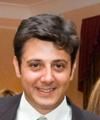Arch. Andrea Rinaldi

Abstract
Think of architecture geared to human well-being and identity, free of excess, built using simple and innovative technologies in accordance with available resources. A simple and durable form of building in which space, form and technology combine. A new way of living, space conducive to a multiplicity of relationships, where simplicity stems from complexity, where passion is ubiquitous.
Biographical notes
Researcher in Architectural and urban composition at the Faculty of architecture of Ferrara, he is Director of the Architecture and Energy Research Centre and a member of the Laboratorio di Architettura (RE).
He conducts research in the field of architectural and urban design and studies the relationship between architectural planning, sustainability and energy. He has written articles in books and magazines for the sector and has won awards and architecture competitions.
A.Rinaldi, (editor) Progettazione ed efficienza energetica, Maggioli, Rimini, 2010
close






